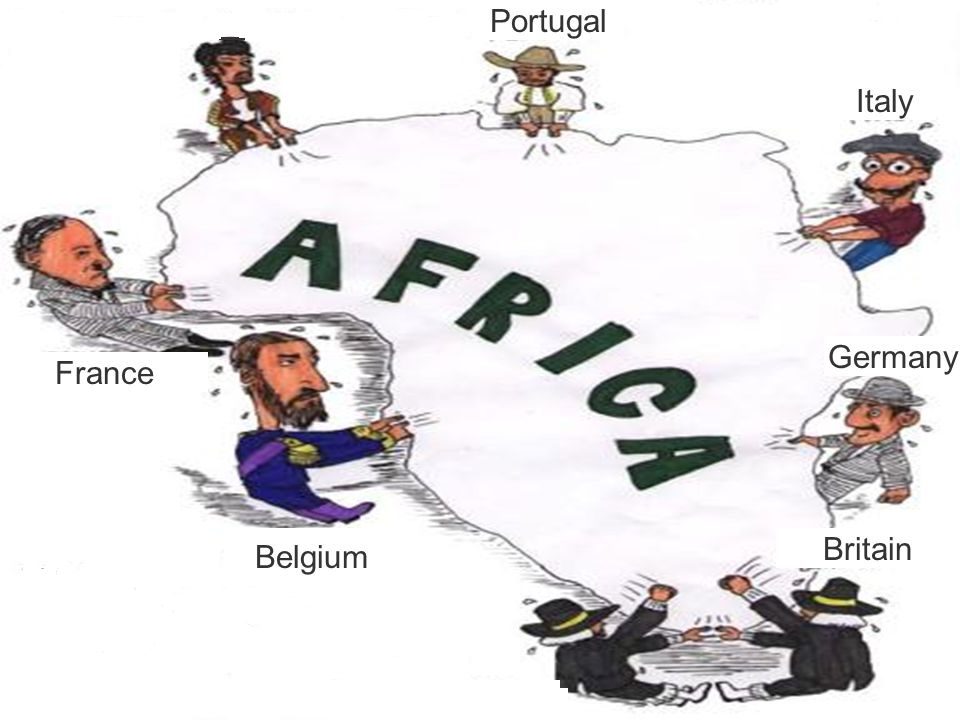Explain the Reasons for the Scramble for and Partition of Africa
Colonialism refers to the situation whereby one powerful nation extend its influence over the weaker nation politically, economically and ideologically. Colonialism in Africa started from the 19th century.
Colonization of the African continent by the European capitalist power is the stage in the development of capitalism which was contributed by the transformation from commercial/mercantile capitalism through industrial capitalism to monopole capitalism.
STAGES OF DEVELOPMENT OF CAPITALISM
Mercantile capitalism – the capitalist stage that based on overseas trade. It developed between 1400 and 1750. During this period, Africa exported products of higher value to Europe while Europe exported goods of lower value to Africa. Also it was the time of the development of slave trade.
Competitive Capitalism – the capitalist system that based on industrial production. It developed between 1750s and 1870s. It was also based on free trade. Free trade became necessary in order to expand markets and control of raw materials abroad. Industrial capitalism based on the need of raw materials, markets, areas for investment, areas for surplus settlements and the need of cheap labour.
Monopoly capitalism (imperialism/colonialism) – the highest level in the development of capitalism that based on the control of overseas provinces/areas. It developed between 1870s and 1960s.
Monopoly capitalism characterized by the following features:
1. Concentration and centralization of capital – put capital in hands of few people to maximize profit.
2. Emergence/development of banks – profit was accumulated through banking system.
3. Export of capital – the capitalist exported capital instead of products.
4. The formation of international monopolistic companies – such companies included GEACO, IBEACO and BSACO which divided the world among themselves.
5. Division of the world among the great capitalist powers – the world was divided and archived through the partitioning of Africa.
SCRAMBLE FOR AND PARTITION OF AFRICA
SCRAMBLE FOR AFRICA
Literally the word “Scramble” means fighting, scuffle or struggling for something between two people or sides.
Scramble for Africa refers to the sudden rush or struggle to acquire different parts in Africa by the European imperialist powers.
Or
Scramble for Africa refers to the struggle or competition among European nations in Africa in order to acquire areas of economic influences.
Or
Scramble for Africa refers to the fighting for colonies or spheres of influence among European imperialist powers in Africa.
The process of scramble for Africa had two major stages which were: –
Phase/ stage one (From 1830‘s – 1880’s)
During this stage, the major participants were Britain, France and Belgium.
Britain had colonized South Africa since 1795 as a colony for settlement which she took it after intensive scramble against the Boers. She had also occupied Sierra Leone as a colony for the ex-slaves in America since 1810.
France had monopolized Senegal, Gambia and Ivory Coast as the major sources of their industrial development. The two powers were also scrambling to monopolize and control River Niger in West Africa.
Belgium in other hand struggled to monopolize and control Congo River and the basin in Central Africa. This was done under the leadership of King Leopold II.
Phase/ stage two (From 1880’s – 1890’s)
This stage was characterized by intervention of the late comers who were Germany and Italy in process of scramble for Africa.
PARTITION
Partition simply means “divide” or “to slice, to divide or to break” something into pieces.”
Partition of Africa refers to the process whereby African continent was divided into pieces among European
Or
Partition of Africa refers to the process of dividing African continent among European nations who were scrambling each other.
The partition process of Africa was done so as to avoid the scrambling or struggle of the imperialist nations in Africa which could result into fighting or wars. This process of dividing the African continent was done during the Berlin conference of 1884 to 1885 which was held in Berlin, Germany under Otto Von Bismarck as the chairman of the conference.
REASONS FOR SCRAMBLE FOR AND PARTITION OF AFRICA
The scramble for Africa reached its zenith towards the last quarter of 19th century. There are two perspectives/ views or approaches which explain the causes of scramble for Africa. These are:
- Eurocentric views/ perspectives
- Afro centric views/ perspectives
EUROCENTRIC APPROACH/VIEWS
These were explanations propounded by capitalist scholars in Europe. According to Eurocentric historians, scramble for and partition of Africa was due to the humanitarian reasons. The following are the reasons for scramble for and partition of Africa:
European Nationalism.
This was union of various small European states which were ruled by princes into bigger empires. In Germany the unification was made under Otto Von Bismarck. This unification made their countries to praise their culture and declared a mission to civilize other cultures hence Germany and Italy rushed to scramble for colonies in Africa.
European Balance of Power.
The balance of power was disrupted by Franco-Prussian war of 1870 -1871 [The wart between France and Germany]. Germany rose to power after defeating France and seizing her two provinces that is Alsace for production of coal and Lorraine for iron. There after France began to scramble for colonies in order to regain its power and compensate for the lost provinces.
Strategic Reasons/ Consideration.
Scramble for and partition of Africa was influenced by protection of commercial interests of the European nations in Eurocentric Historians claims that, European powers scrambled because they wanted to protect her trade interests in Middle East and Far East or Asia.
National Prestige.
The possession of colonies was considered as a symbol of greatness and respect. For example Germany and Italy struggled for colonies with the aim of acquiring national prestige.
Civilization Mission.
European nations claimed that they scrambled in Africa because they wanted to civilize the regrettable They scrambled because they wanted to remove barbaric culture like: Killing twins, believing in many Gods, Women circumcision, Polygamy etc. They further claimed that, it was their burden to civilize the Africans through education and religion, hence scramble for Africa.
Superiority Complex.
European nations scrambled for African colonies because they regarded themselves as superior race. They regarded Africans and Asians as an inferior race which was to be controlled or dominated by superior race, this myth forced European to rush in Africa so as to prove their
Social Darwinism.
Charles Darwin was among the prominent theorists in 19th c in Europe. He proposed a theory “ Struggle for existence and survival of the fittest” which explain the natural selection for The European nations used this theory to Scramble for Africa and colonization of Africa, because to have colonies was a sign of fitness.
Humanitarian Factor.
European nations scrambled in Africa because they wanted to abolish slavery and slave trade because it was against human rights. They claimed that, Africans could not stop this trade and mode of production, therefore they scrambled because each nation wanted to participate in abolishing this
To spread legitimate trade.
The European claimed that they wanted to spread legitimate trade that deals with raw materials, and other natural goods.
AFROCENTRIC APPROACH/VIEWS
These are views propounded by African scholars. According to Afro centric historians, the scramble for and partition of Africa was due to the development of imperialism especially during the stage of the Industrial revolution ( Development of Industrial production) which took place in Europe.
The Industrial revolution which took place in Europe had a lot of problems ( impacts) which faced European nations. In order to solve these problems, they decided to come in Africa, a thing which led to scramble for and partition of Africa.
The following were the impacts (problems) of Industrial revolution which led to Scramble for and partition of Africa according to Afro-centric historians:
The need of raw materials (Overproduction).
This was due to the use of machines in production that increased production something which led to the Shortage of raw materials in Therefore in order to solve this problem, European nations decided to come in African to find raw materials. This led to scramble for and partition of Africa.
The need of markets (Under consumption)
After the Industrial revolution, there was failure of the people to purchase the goods produced in industries effectively. This led to shortage of markets and failure of business to many European As a result they decided to come in Africa to search for markets in order to sell their goods. This led to scramble for and partition of African among European nations.
The need of areas for settlements
After the Industrial revolution there was increase of population in different nations. This was due to many reasons such as availability of plenty of food, improvement of health services and This led to shortage of settlements as houses in towns and cities could not fit the increased population. Therefore, European nations decided to come in Africa to find areas where they could establish settlements so that to reduce government expenditure. This led to scramble for and partition of Africa.
The need of cheap labour (The rise of working class movements)
At the last quarter of the 19th c there was shortage of workers ( Cheap labor) due to the rise of working class movement like Chartism, Luddism, new model trade unions etc. The rise of working movements was due to payments of low wages by the capitalists, poor working condition and lack of insurance especially in Therefore in Europe, it was difficult to get cheap labor who could work in industries and other production areas, as a result Europeans decided to come in Africa to find cheap labor that could help the production of raw materials. This eventually led to the scramble for and partition of Africa
The need of areas for investment (Production of surplus capital)
After industrialization, European nations increased the rate of production, a thing which prompted production of surplus capital ( super profit). This led to the demand (shortage) of investment areas in Europe. European nations demanded opportunities where they could invest their surplus capital, but in Europe, there were no areas to Therefore, they decided to come in Africa where they could invest their surplus capital




































































